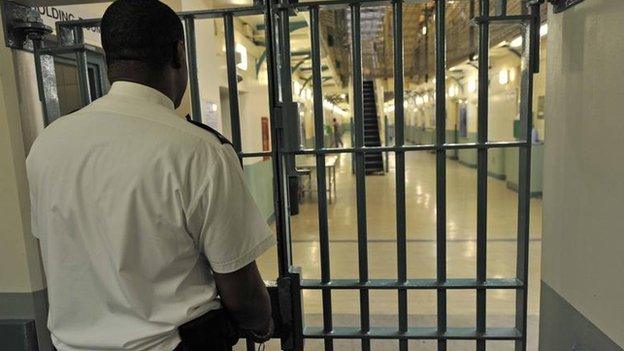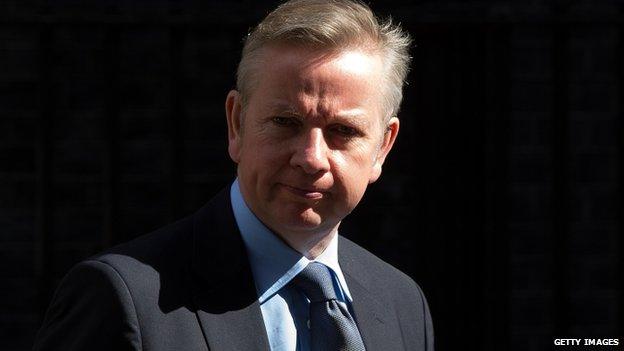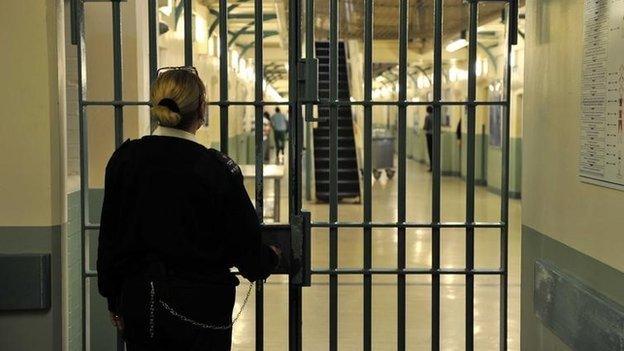Prison staff shortages contribute to suicides, report says
- Published

The independent report made 108 recommendations
Understaffing in prisons in England and Wales could be a factor in suicides among inmates, a review has concluded.
The Independent Advisory Panel studied the deaths of four children and 83 adults, aged 18 to 24, from 2007 to 2013 and made 108 recommendations, external.
Chairman Lord Harris said such deaths represented a "failure by the state" and "radical changes" were needed.
Justice Secretary Michael Gove said the government would consider the recommendations "very carefully".
"Our prisons must punish those who break the law, but they should also be places of rehabilitation that can help rescue offenders from a life of crime," he added.
'Act decisively'
The report said some medical and mental health appointments had been missed because of staff shortages.
The report said "urgent steps" should be taken to fill the recruitment gap that was "putting undue pressure on an already stretched workforce in prisons".
The number of self-inflicted deaths in custody of children and young adults aged 15 to 24 rose slightly from 11 in 2012, and 12 in 2013, to 14 in 2014.
The Ministry of Justice defines a self-inflicted death as any death of a person who has taken their own life, irrespective of intent. This includes suicides and accidental deaths as a result of the person's own actions.

Justice Secretary Michael Gove said the department would consider the recommendations
"Lessons have not been learned and not enough has been done to bring about substantive change," Lord Harris said in the report.
"If the government does not act decisively, then the distressing cases we have considered will be repeated and more young lives will be wasted."
Lord Harris's recommendations include:
There should be investment in new technology, such as video call facilities like Skype
The creation of a new role, namely a custody and rehabilitation officer, to take responsibility for the care of a small number of prisoners, replacing the existing personal officer scheme
A specific policy to deal with bullying
All young adults should spend at least eight hours a day outside of their cell and must be entitled to at least one hour of daily exercise in the open air every day
There should be a process that allows a prisoner to arrange a family visit within three days of their arrival at the prison for the first time
The report said that prison "should be used as a last resort" and that further action was needed to divert more young people out of the criminal justice system.
Lord Harris was critical of the attitudes of some staff members and said he was struck by the "callousness" in some instances.
Dying prisoner
He cited one incident where a prisoner had attempted suicide by hanging and had been taken to hospital.
As they lay dying, prison officers "insisted" on remaining at the foot of the bed, while the offender's parents stood with their child.
Lord Harris said: "It is clear that the prison service needs to make radical changes to protect the most vulnerable people in custody more effectively.
"Young adults in prison are not sufficiently engaged in purposeful activity and the prison environment is grim, bleak and demoralising to the spirit."
Juliet Lyon, director of the Prison Reform Trust, said: "The report raises the fundamental question of why we lock up our most vulnerable young people in our bleakest and most short-staffed institutions."
Deborah Coles, co-director of Inquest, a charity that provides advice to those bereaved by a death in custody, welcomed the report.
She said: "Unless as a society we reconsider dramatically why so many young people in conflict with the law end up in prison, the deaths will continue along with the ongoing trauma for grieving families."
- Published14 November 2014
